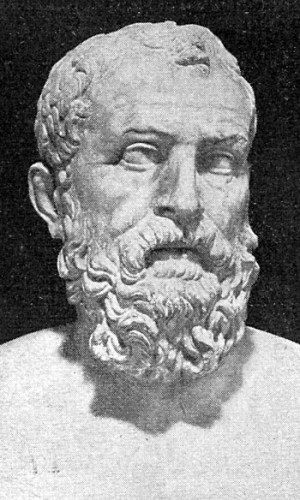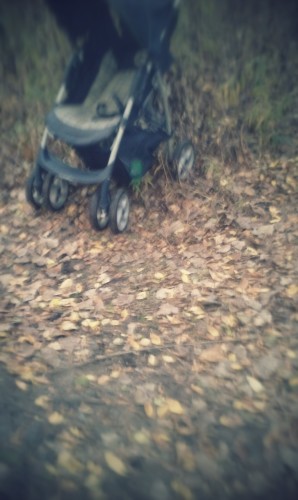This article is part one of a new series, in which I will examine Pagan and Heathen ethical codes. While the Wiccan Rede is arguably the best known Pagan ethical code, it is not the only one followed. We’ll look at a particular code and then explore a specific example of striving to live by that code.
Although credit is often given to the 10 Commandments as the basis for Western culture and morality, that claim more appropriately belongs to Solon and his 10 Precepts. Solon was one of the Seven Sages of Greece and widely credited as the father of Western democracy, the creator of a jury of peers trial and appeals process, and the author of the first written civil constitution.

Bust of Solon [Public Domain]
Solon was an Athenian who lived in the early years of the 6th century BCE. His most famous saying, “Everything in moderation,” was carved into the stone walls at the Oracle of Apollon at Delphi. He also wrote a code of ethics that children memorized and later philosophers examined and built on.
- Trust good character more than promises.
- Do not speak falsely.
- Do good things.
- Do not be hasty in making friends, but do not abandon them once made.
- Learn to obey before you command.
- When giving advice, do not recommend what is most pleasing, but what is most useful.
- Make reason your supreme commander.
- Do not associate with people who do bad things.
- Honor the gods.
- Have regard for your parents.
Doing Good Things
The 10 Precepts of Solon is one of the ethical codes followed by many Hellenic polytheists. In these precepts, Solon tells us to be respectful toward our parents, even when we don’t obey them due to disagreements over morality. We are cautioned against prematurely setting ourselves up as an authority figure or blindly following others who don’t possess the wisdom and maturity to lead. He tells us to think things through carefully instead of allowing emotion to rule us. And, we should choose our friends and elect our politicians based on what they do, rather than by what they say.
He also tells us to Do Good Things.
Do – constantly, not only in the past or sometime (perhaps) in the future.
Good – something that has a positive impact on others.
Things – material, concrete actions, not just talking about it.
For myself, Doing Good Things entailed bringing food and comfort to persons experiencing homelessness.
Ethics in Action
I’ve long dropped off donations to food-shelves, usually as part of my monthly Deipnon observance. Each time I drop off food, hygiene items, or cash donations the staff are extremely grateful. I also volunteer to serve meals and help clean up at soup kitchens. While there, I learned that persons experiencing homelessness need respectful human contact equally as much as the food. They need to be treated as a human being of worth and value. That is when I started to take an additional, and more direct approach, to Doing Good Things.
I make packets filled with items a person experiencing homelessness might need and keep a few of them in my car and in my backpack. Hand warming packets, socks, snacks, wet wipes, gift cards to fast food places or convenience stores, and hygiene items. When I see someone in need, I hand them a ziplock bag filled with these items along with a wish for good fortune. I look them in the eye. I shake their hand. One older lady held onto my hand and whispered in a choked voice, “Thank you for seeing me.”
Yes, I see them. Or I thought I was seeing them. Until my friends Aaron and Todd took me out to an encampment.
Last Friday I met up with Aaron and Todd in a St. Paul park. Both men have been going to encampments set up by homeless persons for quite some time. I knew the camps existed, but wasn’t sure where they could possibly be located in the heart of a major city. In an alley? That seemed unlikely. An underpass? Also unlikely. It turns out they are all around, just a few steps away from many major intersections. I just wasn’t seeing them.
We met at the park and pooled together what we had brought. I brought sandwiches, poptarts, apples, Sunny Delight, socks, pads, and fresh cheese snacks. Aaron brought gloves, hats, and various hygiene items. Todd had water, Halloween candy, ziplock bags, and 150 bags of chips. We assembled the items into ziplock bags and ended up with about 110 finished bags. We were set.
![[Photo Credit: C. Schulz]](https://wildhunt.org/wp-content/uploads/2015/11/20151030_172642-2-500x300.jpg)
[Photo Credit: C. Schulz]
There was only one tent found in this normally popular encampment, and Todd was a bit worried. Had police cleared them out? This happens periodically. The idea is to clear them out and take away their tents to force them into shelters before winter sets in. Yet there are reasons why some people choose to face the harsh Minnesota winter rather than sleep in a shelter. Not all shelters allow men to stay with their families. Persons may be struggling with mental health issues and are fearful of being locked into a room with a large group of people they don’t know. They may fear catching some type of illness or having what little they own stolen. They may not be able to comply with shelter rules, such as “no pet” rules or limits on drug or alcohol use. Or they may not be willing to join in required religious activities.
Yet current government policy is to clear out these camps by destroying the tents and sleeping bags. This enforcement doesn’t push most campers into shelters; it forces them to relocate and try to survive with even less protection from the elements. When they get another tent, they’ll take it down each morning and set it back up each evening in an attempt to draw less attention to themselves.

[Photo Credit: C. Schulz]
“Socks! There’s socks in here!” I heard that more than once. Socks are like gold. They’re the most needed, but often the least donated item. Sunny Delight was also a hit, and I made a mental note to buy more. We chatted with them and joked around.
Todd asked where people were now camping out, and he noted the locations. One was a just a bit deeper back from where we looked. Todd said that is how he first found the camps; by asking people at the shelters where the camps are. It is as simple as that, once you gain their trust.
I was asked a few times what group or church I was with. Why I was doing this? My answers were some variation of, “I’m just a person, like you.”
Todd warned me that after I did this I’d be hooked, and he’s right. People need food. They need clothing and warmth. They need respect, and they need to be seen. So why not give it to them? It was so easy and so simple.
This is one of the ways that I am trying to live by the Precepts of Solon. What are some of the things you do, big and small, to directly and positively impact others’ lives? What are the ways you Do Good Things?
* * *
Over the next year, Cara Schulz will continue to explore the many different ethical codes present in modern Pagan, Heathen and Polytheist practices. With help from others, she will highlight the codes themselves, their history and how they manifest in people’s daily lives.
Part Two Coming Soon …
The Wild Hunt is not responsible for links to external content.
To join a conversation on this post:
Visit our The Wild Hunt subreddit! Point your favorite browser to https://www.reddit.com/r/The_Wild_Hunt_News/, then click “JOIN”. Make sure to click the bell, too, to be notified of new articles posted to our subreddit.
I was glad to read the historical part of this. However, the piece was not so much about Solon as about the author’s “good deeds”. Not what I want to read about.
Cara, thank you for this article. It is useful to hear how others
interpret and actualize the ethical and moral components of our various
traditions. I love Alley’s posts for this aspect too. The more examples I
hear the more ways I can explore actions to take and deepen
understanding of my own trad.
I lived this! Just go out and be gentle